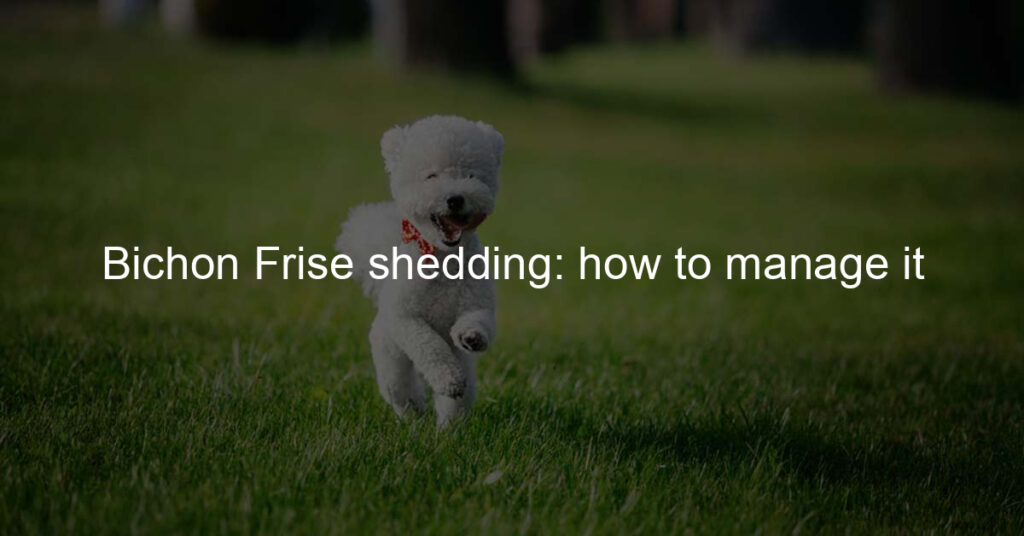Do you own a bichon frise? If so, you know they’re beautiful and playful – but there’s one thing that frustrates many owners: the shedding. No matter how often you brush or groom your pup, daily lint-rolling seems like an inescapable part of life—right? Well, don’t despair. You don’t have to live with it! In this blog post, we’ll talk about why bichons shed and what you can do to reduce the amount of fluff around your house. With a few simple tips and tricks, men and women alike can keep their furry friends looking healthy while also keeping their carpets clean. Let’s go!
Do Bichon Frise shed a lot?
The Bichon Frise is a wonderfully family-friendly breed that is intelligent, strong-minded, and very affectionate. One of the things that people love most about them is that they are considered hypoallergenic, meaning they cause fewer allergic reactions than other breeds.
But when it comes to shedding, does Bichon Frise shed a lot? Fortunately, the answer is no! These little beauties barely shed at all, which means you won’t have to deal with pet hair or dander on the floor or furniture – another great perk of having a Bichon Frise in your home.
Why is my Bichon shedding so much?
Grooming your Bichon is an important part of being a pet owner; however, dealing with their shedding can be a bit challenging. The amount of fur that comes from our beloved Bichons can seem outrageous at times, and it’s normal to ask why this is happening. Well, the answer is that all breeds of dogs shed. Though some breeds may shed more than others, all shedding serves the same purpose: to get rid of old and damaged fur.
However, when it comes to our Bichons, they just happen to have very high grooming needs because they have double coats which tend to shed more. To combat this challenge, it’s a good idea to brush your Bichon regularly with a quality bristle brush or comb—at least once every week—to reduce the amount of fur spread around your home!
Should bichons be shaved?
When it comes to a bichon’s hairstyle, opinions vary greatly. Some people heavily advocate shaving the fluffy canine’s coat due to both practical and aesthetic reasons. Practically speaking, regular shaving can reduce shedding and make bichons easier to groom in general. Additionally, it can also give them an elegant, poodle-like appearance that some owners find attractive on their pets.
However, other owners disagree with this approach as they prefer their pooch’s natural look. For those who do choose to go the shaving route, it’s important to remember not to shave too close as doing so could potentially damage the coat, leading to uncomfortable skin irritations and other complications. Ultimately, it is up to each owner on how they ultimately decide haircut their furry friend.
How often should I shower my Bichon Frise?
If you have a Bichon Frise, you probably know that they need regular grooming to keep their coat and skin healthy. While there is no hard and fast rule on how often to shower your pup, most experts agree that it’s best to shower your Bichon at least once a month using a mild shampoo specifically designed for dogs.
Depending on your dog’s activity level or exposure, you may need to wash more often. If your dog has been playing in the mud or out in the rain, you might want to give them an extra bath as soon as possible so their skin doesn’t suffer from exposure. Even if you don’t go for full body baths all that frequently, it’s important to make sure their face and paws stay clean so any dirt or debris isn’t ingested by your pup. With regular bathing, along with brushing and occasional professional grooming treatments, your Bichon will stay healthy and happy for many years.
Summary
As you can see, managing the shedding of your Bichon Frise can be a challenge. There are various strategies outlined above that might help make life easier for you and your cute doggy. A key takeaway is to always invest in quality grooming and brushing tools as these will offer your pooch the comfort it deserves during its daily grooming routine.
Additionally, regular baths with a moisturizing shampoo and frequent vacuuming are two more steps in the direction of helping this breed with its shedding woes. Finally, remember that the very nature of the breed means that there may come a point when heavier sheddings become inevitable, particularly when seasons change or in other circumstances unique to your pet.
Whatever path you choose to follow, rest assured that a little patience and love will get you through any caregiving hurdles!








